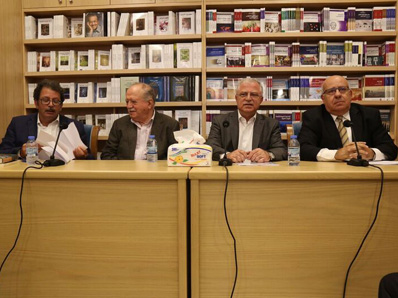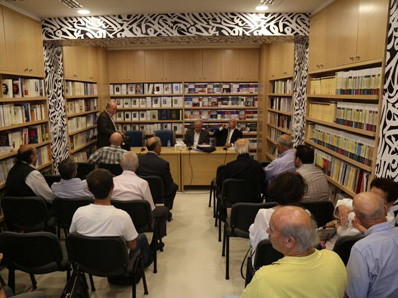 Describing the effects of the Arab Spring, Beydoun’s book reminds its readers of the exhilarating hope for democratization that came with the Tunisian and Egyptian revolutions, and the optimism that was dashed following the Syrian and Libyan uprisings, which rapidly evolved into civil war. In his book, Beydoun offers a compelling analysis of authoritarian regimes, which he views as a new inheritance in the region, and sectarianism, which he deems the leading obstacle for Arab societies experiencing revolution. Introducing the book, Abu Fakhr commented on how the book refreshed “the biography of an Arab generation that battled against events since the Palestinian Nakba (1948), the Algerian revolution (1954), the tripartite aggression on Egypt (1956), the Syrian-Egyptian union (1958), the overthrow of the monarchy in Iraq (1958), and the breakup of the Syrian-Egyptian union (1961), leading on to the prolonged series of changes that swept through the Arab world after the 1967 defeat until today. Touched upon in the book are therefore critical issues such as Arab movements for change, sectarianism, identity, citizenship. secularism, confession, religion, and the healing of nations that comes after dismembering them.
Describing the effects of the Arab Spring, Beydoun’s book reminds its readers of the exhilarating hope for democratization that came with the Tunisian and Egyptian revolutions, and the optimism that was dashed following the Syrian and Libyan uprisings, which rapidly evolved into civil war. In his book, Beydoun offers a compelling analysis of authoritarian regimes, which he views as a new inheritance in the region, and sectarianism, which he deems the leading obstacle for Arab societies experiencing revolution. Introducing the book, Abu Fakhr commented on how the book refreshed “the biography of an Arab generation that battled against events since the Palestinian Nakba (1948), the Algerian revolution (1954), the tripartite aggression on Egypt (1956), the Syrian-Egyptian union (1958), the overthrow of the monarchy in Iraq (1958), and the breakup of the Syrian-Egyptian union (1961), leading on to the prolonged series of changes that swept through the Arab world after the 1967 defeat until today. Touched upon in the book are therefore critical issues such as Arab movements for change, sectarianism, identity, citizenship. secularism, confession, religion, and the healing of nations that comes after dismembering them.
Non-Violence and Confessions in the Constitution
“This book is very important both objectively and emotionally,” commented researcher Shibli al-Mallat in the opening of his speech, saying that “the subjective and the objective come together in Ahmad Beydoun's posing of difficult questions which all of us have often pondered on.”
Al-Mallat noted that revolution in the region – the correct term, he stressed, given the initial success in overthrowing four Arab dictators – was opposed by counterrevolution, an issue Beydoun refers to in his book. This made the Arab Spring, the most momentous event in contemporary history for Ahmad Beydoun, face many setbacks, even in Tunisia where the constitutional process was largely consensual with masses committed to unite around the constitution and the holding of regular free elections. Al-Mallat considered the book “an anthology of deep analyses of different aspects of the counterrevolution, most significantly the sectarian component, a subject the author brilliantly elucidates throughout his long and prolific career.
He then concluded with a critique of the book, noting how the book failed to touch upon the issue of non-violence. This non-violent revolution included almost the whole Arab world between 2005 and 2012. It was a new form of non-violence, he noted, that confronted the violence of dictatorial authority. His second criticism of the book concerned the absence of a historical approach to the Arab revolution on the global level. A third absence concerned the constitutional efforts regarding sectarianism in Arab societies.
Aborted Hope for Democracy
 Khaled Ziade, the ACRPS Beirut Branch Director, felt the author took the events of 2011 to be an extension of the life of the author’s own generation. This was because it was possible for those who witnessed and lived the movements or uprisings to consider them to be an extension of their own lives. For this reason, “Beydoun prefaced his book with his own personal biography, that which concerned itself with national concerns and which included periods devoted to party and political action, as well as to the practices of writing as a social and intellectual act.” Members of that generation “waited for such an event their whole lives, in the hope of the long-awaited change.”
Khaled Ziade, the ACRPS Beirut Branch Director, felt the author took the events of 2011 to be an extension of the life of the author’s own generation. This was because it was possible for those who witnessed and lived the movements or uprisings to consider them to be an extension of their own lives. For this reason, “Beydoun prefaced his book with his own personal biography, that which concerned itself with national concerns and which included periods devoted to party and political action, as well as to the practices of writing as a social and intellectual act.” Members of that generation “waited for such an event their whole lives, in the hope of the long-awaited change.”
According to Ziade, what swayed the author to be optimistic and euphoric at the beginning of the Spring were the “slogans and ideas it launched and that promised the coming of democracy as an alternative to one-party authoritarian regimes.” These held out the prospects of “hope for a regime with the separation of powers, an independent judiciary, and the sovereignty of an elected parliament with immunity for its members,” in addition to “the political neutrality of public administration, freedom to form parties, the freedom to form associations, activate organizations and organize labor unions, fair and free elections, freedom of communications and media, the linking of development with steps towards social justice, and the upholding of citizenship – these by no means an exhaustive list of what would constitute a genuine Arab democratic revolution.
Ziade concludes that in his new book Ahmad Beydoun returns to “his favorite subject of sectarianism, this time delving even deeper into it in light of the developments following 2011, and making a distinction between doctrine and sect.” To conclude, Ziade paid homage to “the effort Beydoun has made in all his writings and his search for a means to express his ideas”. His constant attention, he added, “has been to illuminate the events of past years, while maintaining his patient way of narrating, commenting, and analyzing events.” In this sense, he noted, this book is prominent among those that have been written and will be written about a period that changed our thinking.